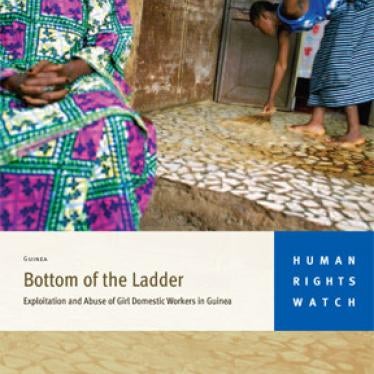Thousands of girls employed as domestic workers in Guinea face labor exploitation and physical abuse, Human Rights Watch said in a report released today, on the eve of the International Day of the African Child. The new Guinean government, which took office in March, should fulfill its pledge to improve living conditions for youths, including child domestic workers.
The 110-page report, "Bottom of the Ladder: Exploitation and Abuse of Girl Domestic Workers in Guinea," documents how girls as young as 8 years old work up to 18 hours a day as domestic workers, frequently without pay, and are often insulted, beaten and raped by their employers. Domestic work is the largest employment category among children in Guinea. Girls come from as far as Mali, and some are victims of trafficking and forced labor.
"Girls recruited into domestic work in Guinea often live in conditions akin to slavery, and many are victims of trafficking," said Juliane Kippenberg, a children's rights researcher at Human Rights Watch and the author of the report. "The new government urgently needs to take concrete measures to protect girl domestic workers."
The large majority of girls interviewed by Human Rights Watch said their employers refused to enroll them in school, even when other children in the family were attending school. Current efforts in Guinea to increase girls' primary school enrollment, in line with the United Nations Millennium Development Goals, fail to target girl domestic workers.
A 15-year-old girl, sent by her father at age 8 to work for a woman in the capital Conakry, told Human Rights Watch: "The woman suggested to my father that she could look after me and send me to school .... I have not been in contact with my father since .... The other children in the family go to school but not me. The promise of education was never mentioned again. I do the domestic work and sell piment [hot pepper]. When she is gone, her husband wakes me up and rapes me. He has threatened me with a knife and said I must not tell anyone. He does it each time his wife travels. I am scared."
There is no child protection system in Guinea. Child trafficking, child abuse, and labor exploitation are very rarely prosecuted. In March, a new government took office following popular protests against corruption, poor governance and worsening economic conditions. The new prime minister, Lansana Kouyaté, has pledged to focus on establishing the rule of law and improving living conditions for youths.
"Ending abuses against girl domestic workers should be a priority on the new government's agenda for youth," Kippenberg said. "Local NGOs currently provide the only source of protection and assistance for child domestic workers, but they lack resources and cannot cover the country systematically."
Human Rights Watch urged the Guinean government with the support of its international donors and intergovernmental organizations, including UNICEF, to:
- Investigate and punish those responsible for child trafficking, physical and sexual violence against children, and labor exploitation. Take steps to professionalize judicial staff and curb corruption in the judiciary.
- Set up a child protection system that allows for systematic monitoring of children without parental care, in particular girl domestic workers. This should allow for the removal of girls from abusive environments, and reunification with their families or placement with foster families, if this is in the best interest of the child. Such a protection system should be established in close collaboration with international agencies and national nongovernmental organizations (NGOs).
- Take specific measures to improve access to education for child domestic workers, such as the creation of more schools that offer primary education for children older than the official enrollment age (so-called Nafa schools or "schools of the second chance") in Conakry and other urban centers.
- Amend article 5 of the Labor Code and Decree 2791 on Child Labor to set the minimum age for work as 15. Enforce existing labor protections and assist child domestic workers seeking redress through labor tribunals.







